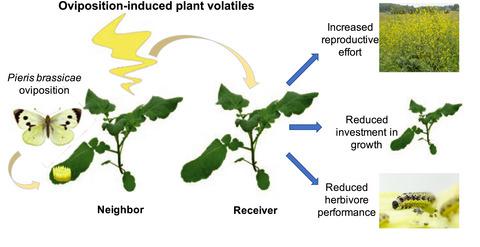当前位置:
X-MOL 学术
›
Ecol. Lett.
›
论文详情
Our official English website, www.x-mol.net, welcomes your
feedback! (Note: you will need to create a separate account there.)
Plant volatiles induced by herbivore eggs prime defences and mediate shifts in the reproductive strategy of receiving plants.
Ecology Letters ( IF 7.6 ) Pub Date : 2020-04-21 , DOI: 10.1111/ele.13509 Foteini G Pashalidou 1, 2 , Lisa Eyman 1 , James Sims 1 , James Buckley 1 , Nina E Fatouros 3 , Consuelo M De Moraes 1 , Mark C Mescher 1
Ecology Letters ( IF 7.6 ) Pub Date : 2020-04-21 , DOI: 10.1111/ele.13509 Foteini G Pashalidou 1, 2 , Lisa Eyman 1 , James Sims 1 , James Buckley 1 , Nina E Fatouros 3 , Consuelo M De Moraes 1 , Mark C Mescher 1
Affiliation

|
Plants can detect cues associated with the risk of future herbivory and modify defence phenotypes accordingly; however, our current understanding is limited both with respect to the range of early warning cues to which plants respond and the nature of the responses. Here we report that exposure to volatile emissions from plant tissues infested with herbivore eggs promotes stronger defence responses to subsequent herbivory in two Brassica species. Furthermore, exposure to these volatile cues elicited an apparent shift from growth to reproduction in Brassica nigra , with exposed plants exhibiting increased flower and seed production, but reduced leaf production, relative to unexposed controls. Our results thus document plant defence priming in response to a novel environmental cue, oviposition‐induced plant volatiles, while also showing that plant responses to early warning cues can include changes in both defence and life‐history traits.
中文翻译:

食草动物卵诱导的植物挥发物在接收植物的繁殖策略中起主要的防御作用并介导转变。
植物可以发现与未来食草动物风险有关的线索,并相应地改变防御表型。但是,我们目前对植物响应的早期预警信号的范围和响应的性质都知之甚少。在这里,我们报告说,暴露于食草动物卵侵染的植物组织中的挥发性排放物会促进对两个芸苔属植物的随后食草的较强防御反应。此外,暴露于这些挥发性暗示导致黑芥子从生长到繁殖的明显转变。,与未暴露的对照相比,暴露的植物显示出更高的花和种子产量,但叶片产量却下降。因此,我们的结果记录了植物防御对新环境线索(产卵诱导的植物挥发物)的响应,同时还表明植物对预警线索的响应可能包括防御和生活史特征的变化。
更新日期:2020-04-21
中文翻译:

食草动物卵诱导的植物挥发物在接收植物的繁殖策略中起主要的防御作用并介导转变。
植物可以发现与未来食草动物风险有关的线索,并相应地改变防御表型。但是,我们目前对植物响应的早期预警信号的范围和响应的性质都知之甚少。在这里,我们报告说,暴露于食草动物卵侵染的植物组织中的挥发性排放物会促进对两个芸苔属植物的随后食草的较强防御反应。此外,暴露于这些挥发性暗示导致黑芥子从生长到繁殖的明显转变。,与未暴露的对照相比,暴露的植物显示出更高的花和种子产量,但叶片产量却下降。因此,我们的结果记录了植物防御对新环境线索(产卵诱导的植物挥发物)的响应,同时还表明植物对预警线索的响应可能包括防御和生活史特征的变化。











































 京公网安备 11010802027423号
京公网安备 11010802027423号